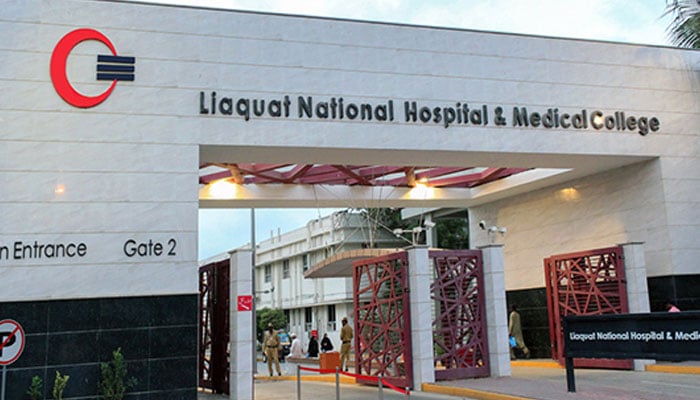LNH symposium calls for using AI to improve health care
Prof Dr Atta Ur Rehman has stressed the need for excelling in new technologies such as artificial intelligence, genetic engineering and biotechnology that have been transforming lives in many ways.
Talking about recent advances in health sciences during the 8th Symposium of the Liaquat National Hospital (LNH) on the theme, ‘Pakistan's Healthcare Conundrum – Balancing Cost, Quality and Technology’, he insisted on promoting the culture of research and knowledge.
The symposium covered a diverse collection of topics related to technological advancements in health care, public health, quality control and future of healthcare in Pakistan.
The three-day event featured more than 70 scientific sessions of medical and surgical specialties, sub-specialties, basic sciences, medical education and allied health sciences along with a special scientific session on the current challenges of hospital administration. The symposium covered oral and e-poster presentations of over 700 research papers. Doctors from leading national and international institutions and hospitals participated in the symposium. Prior to the event, 120 pre-symposium workshops covering an extensive range of subjects and skills were also held at the LNH.
The inaugural session of the symposium included an informative video conference on the topic ’Antibiotics & Beyond’, which focused on the use and misuse of antibiotics and the dilemma of antibiotic resistance. The participants included Dr Syed Faisal Mahmood, professor of infectious diseases at the AKU, Dr Rizwan C Naeem, professor of pathology at the Albert Einstein College of Medicine and Montefiore Medical Center in New York, and Dr Christine Peters, consultant clinical microbiologist in Glasgow.
Speaking at the inauguration, Prof Dr Salman Faridi, LNH medical director, called for finding solutions to the pertinent challenges being faced in the local healthcare arena.
Prof Dr Saleha Shahzad, LNH assistant medical director, highlighted how the symposium aimed at bringing together medical professionals, policymakers and industry leaders to discuss the critical challenges facing Pakistan’s healthcare system.
The first day of the symposium included a plenary session that started with a thematic talk by Prof Dr Aziza Shad, US-based expert in paediatric hematology and oncology. She began by highlighting the dire situation of paediatric cancers stating that about 105,000 deaths occurred worldwide annually due to paediatric cancers mostly in low- and middle-income countries (LMIC) like Pakistan, despite the fact that most such cancers were curable.
The second talk was by Prof Faridi who highlighted the administrative challenges of balancing cost, quality and technology in hospitals. He presented an overview of current healthcare metrics like 1,256 hospitals for a population of 225 million and a spending of 1.2% of the GDP on health.
This was followed by a panel discussion regarding the challenges faced by healthcare institutions in Pakistan. The panellists included Prof Dr Tipu Sultan, Prof Dr Naseem Sallahuddin, Prof Dr Marie Andrades and Dr Fawad Sarwar. They explored critical healthcare delivery issues like low GDP, disparity in funding of different health centers, loss of working female health professionals and doctors’ brain drain, and brainstormed possible solutions.
-
 Kanye West's Last Measure To Save Bianca Censori Marriage As He Tries To Salvage Image
Kanye West's Last Measure To Save Bianca Censori Marriage As He Tries To Salvage Image -
 Kim Kardashian Finally Takes 'clear Stand' On Meghan Markle, Prince Harry
Kim Kardashian Finally Takes 'clear Stand' On Meghan Markle, Prince Harry -
 Christina Applegate Makes Rare Confession About What Inspires Her To Keep Going In Life
Christina Applegate Makes Rare Confession About What Inspires Her To Keep Going In Life -
 Patrick J. Adams Shares The Moment That Changed His Life
Patrick J. Adams Shares The Moment That Changed His Life -
 Selena Gomez Getting Divorce From Benny Blanco Over His Unhygienic Antics?
Selena Gomez Getting Divorce From Benny Blanco Over His Unhygienic Antics? -
 Meet Arvid Lindblad: Here’s Everything To Know About Youngest F1 Driver And New Face Of British Racing
Meet Arvid Lindblad: Here’s Everything To Know About Youngest F1 Driver And New Face Of British Racing -
 At Least 30 Dead After Heavy Rains Hit Southeastern Brazil, 39 Missing
At Least 30 Dead After Heavy Rains Hit Southeastern Brazil, 39 Missing -
 Courtney Love Recalls How ‘comparison’ Left Marianne Faithfull ‘broken’
Courtney Love Recalls How ‘comparison’ Left Marianne Faithfull ‘broken’ -
 Pedro Pascal Confirms Dating Rumors With Luke Evans' Former Boyfriend Rafael Olarra?
Pedro Pascal Confirms Dating Rumors With Luke Evans' Former Boyfriend Rafael Olarra? -
 Ghost's Tobias Forge Makes Big Announcement After Concluding 'Skeletour World' Tour
Ghost's Tobias Forge Makes Big Announcement After Concluding 'Skeletour World' Tour -
 Katherine Short Became Vocal ‘mental Illness’ Advocate Years Before Death
Katherine Short Became Vocal ‘mental Illness’ Advocate Years Before Death -
 SK Hynix Unveils $15 Billion Semiconductor Facility Investment Plan In South Korea
SK Hynix Unveils $15 Billion Semiconductor Facility Investment Plan In South Korea -
 Buckingham Palace Shares Major Update After Meghan Markle, Harry Arrived In Jordan
Buckingham Palace Shares Major Update After Meghan Markle, Harry Arrived In Jordan -
 Demi Lovato Claims Fans Make Mental Health Struggle Easier
Demi Lovato Claims Fans Make Mental Health Struggle Easier -
 King Hospitalized In Spain, Royal Family Confirms
King Hospitalized In Spain, Royal Family Confirms -
 Japan Launches AI Robot Monk To Offer Spiritual Guidance
Japan Launches AI Robot Monk To Offer Spiritual Guidance




